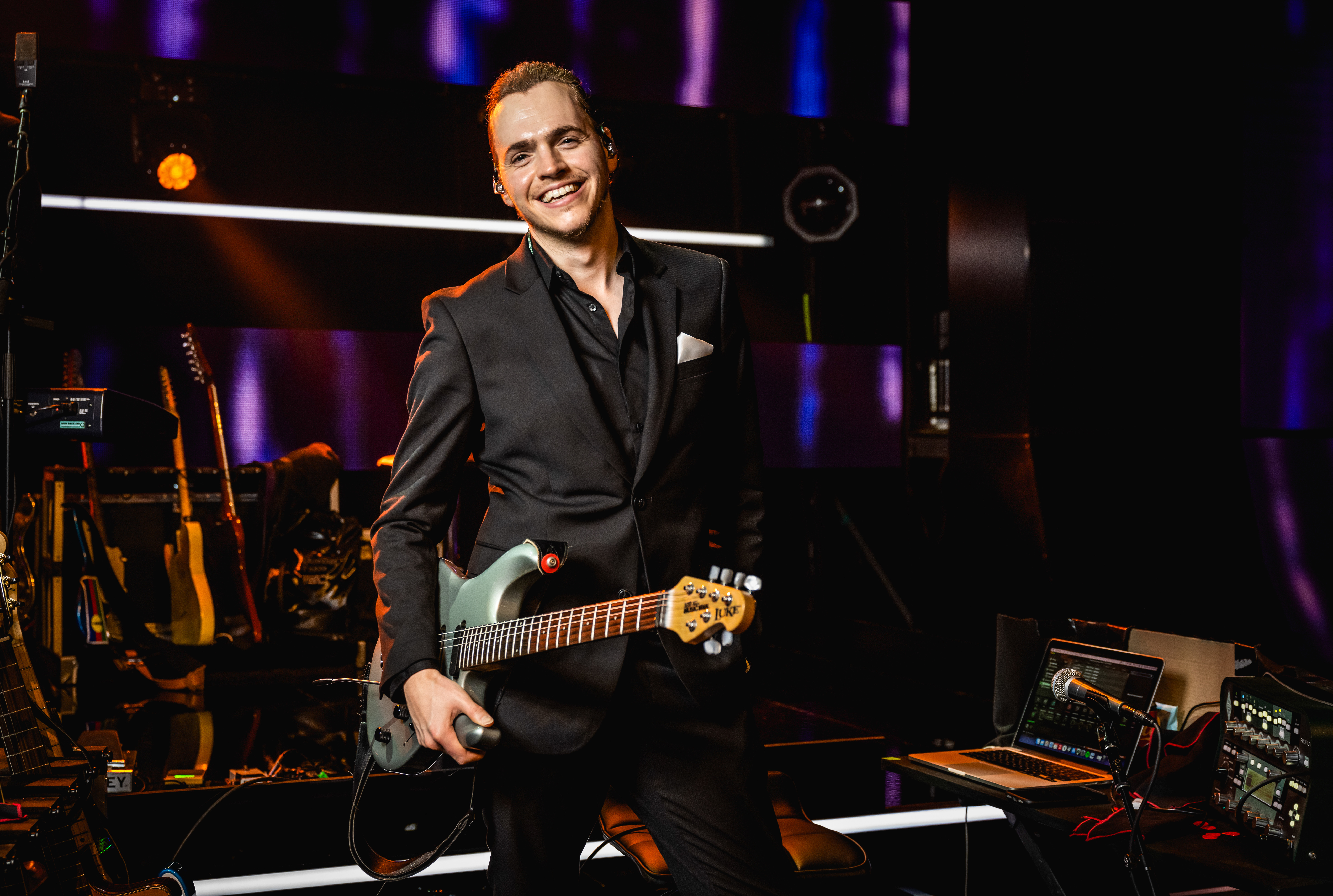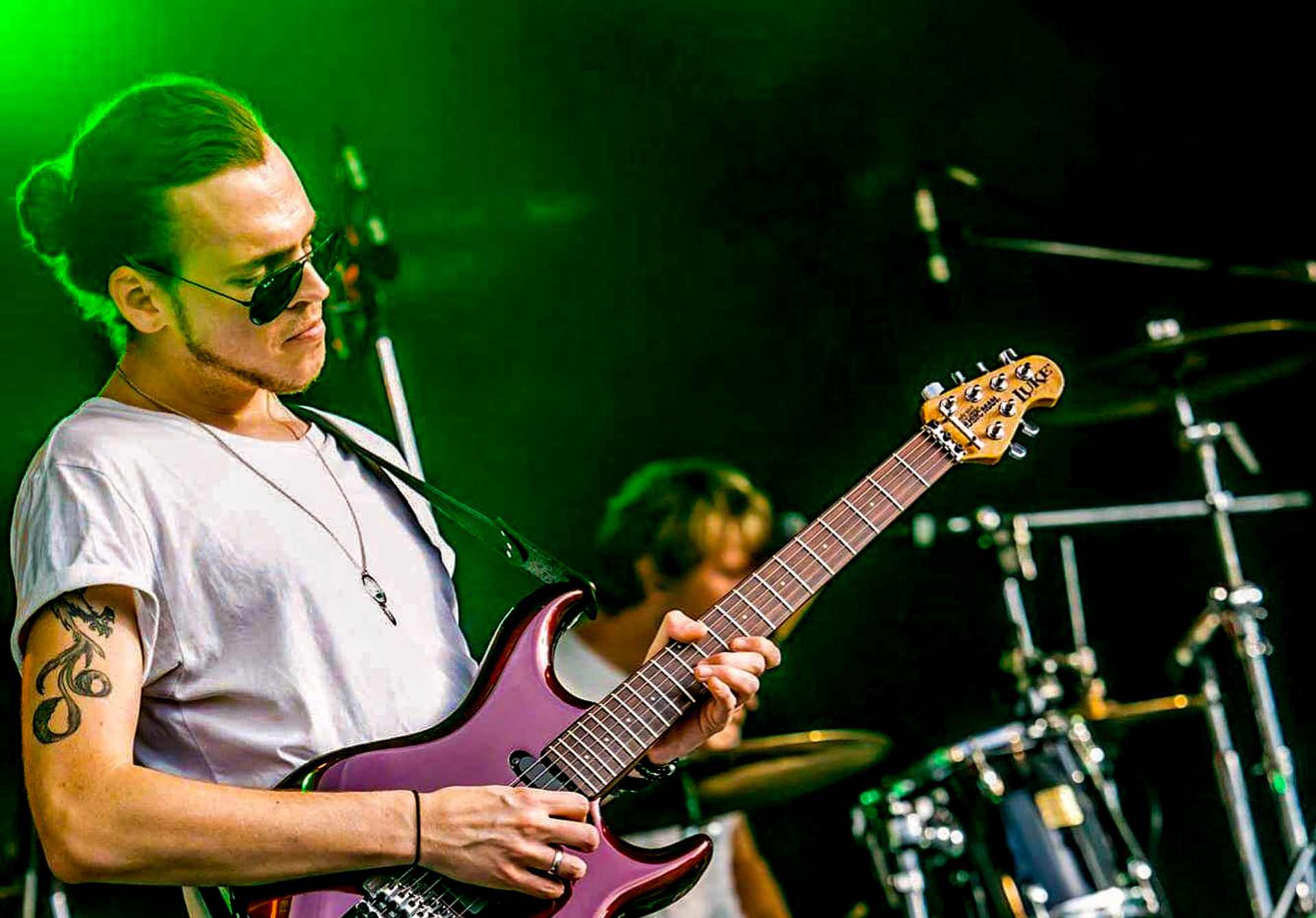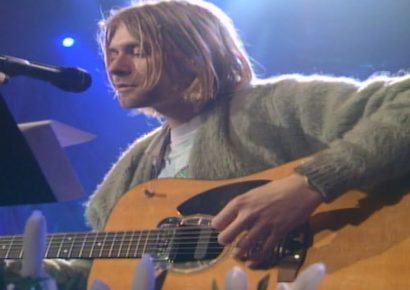Photos by Martin Caulfield
Dreaming of a career as a session guitarist? Here's how guitarist Dan Maher, whose stacked resume boasts a performance on Ellen with Rita Ora, stints on The Voice and Australian Idol has made it happen.
Welcome to the inaugural instalment of our brand new series – How I Got Here, where music industry professionals give Mixdown readers the skinny on exactly how they’ve made it in their corner of the biz.
Read up on all the latest interviews here.
Today we’re chatting with pro session Guitarist Dan Maher, whose stacked resume boasts a performance on Ellen with Rita Ora, stints on The Voice and Australian Idol, and backing up Little Mix, Adam Lambert and Joe Jonas during their Australian tours. Dan chats all things networking, provides his best advice and stresses the power of adaptability and versatility in the field.
Tell us a bit about yourself! Can you please briefly describe your musical journey to this point? What kind of training/experience do you have under your belt?
I started playing guitar when I was 12 years old, although I’d gone through a few different instruments prior to this, like drums and saxophone (my dad even tried to teach me acoustic guitar once before) and they never really stuck. Truthfully I didn’t even have that much interest in playing until heard a solo on an Eminem track in 2004 and was inspired to pick up an electric guitar and I was instantly hooked. I started playing with my first high school band about 6 months later, and we’d do local charity gigs, battle of the band competitions and other gigs of that nature. We’ve all gone on to have successful careers in the industry now which is kind of cute to look back on. Four years later when I was about 16, through a referral from a parent of one of my school friends, I ended up then getting a call from a local MD to play in an amateur theatre production of ‘Shout: The Musical’… and this was really where my career trajectory began. I ended up playing for 45 amateur musicals before I’d even left school… learning skills that set me up for a career as a session player and sideman – things like reading notation, following a conductor, stylistic versatility, and learning my role in a band etc. I never wanted to be a rockstar, as my passion was always geared towards using my skills to help bring other people’s music to life.
I have no tertiary training – I did music extension in high school, as well as private tuition with a variety of amazing teachers including Saul Richardson of Jazz Workshop Australia. I got into The Sydney Con Jazz course, but I deferred and went to Japan on a contractual gig for the better part of that year. It was my first time away from home and was an incredible experience. When I came back, the phone started ringing and I started gigging full time and never looked back. I’ve always felt there’s no substitute for learning on the job anyway, so am grateful to now be 31 years old with 15 years of professional experience under my belt.

Tell us about how you first got started as a session guitarist – did you always know it was what you wanted to do, or did your passion lead you there organically?
Absolutely – I only ever wanted to be a session player! Like I said, I never wanted to be in my own band or an artist in my own right… probably largely because I never had any interest in writing my own music until recently. I always felt like what I did best was serve other people’s music and help bring their ideas to life. I remember being a kid watching the original Australian Idol band back in the day and being so inspired to be doing that kind of work… I always loved the idea of being heard more than being seen, and the thought of playing on such a high level as a hired gun was far more exciting to me than being the one in the spotlight. Music theatre was really how I learned to be a team player, and for a long time I thought that was solely what I wanted to do with my career until I actually branched out into different areas of the industry and realised there was so much more out there that really made me tick.
What would you say the most important piece of advice is for an aspiring session musician? Could you tell us a little bit about, in your opinion, what the best approach to breaking into the industry is?
It’s really important to know your place and your role in any musical situation. To be a good session player or sideman, you have to be able to adapt to the song/job, which sometimes means wearing a multitude of different hats. However, if you can be versatile and take direction/suggestions well, you’re half way there. The rest of it mostly comes down to doing the basics really well – things like playing in time, in tune and with appropriate stylistic sensibilities. The importance of having good reliable gear, being on time, being prepared, and being a positive energy should never be underestimated. For example, If you’re on a TV set all day, in a studio, or on the road, there is a lot of downtime and if you’re no fun to be around – it won’t matter how great you are at what you do. Another important thing to note is that as a session player, it’s your job to serve the music over your ego – you have to be what the song needs and resist any temptation to needlessly showoff everything you know how to do. More often than not, this means taking a simpler approach: less is more, especially when you’re playing behind a vocalist.
It’s really hard to answer the second part of this question because unlike any other industry, you can’t just go get a degree and then subsequently interview at a company in that field to get a job etc. There are honestly a thousand ways to get into session playing, and for me, it was through the music theatre channel. Despite being amateur and not really propelling me into the professional side of the industry, it opened me up to the skillset that is demanded of professionals in the field. But regardless of what your path is, I guarantee that networking will be EVERYTHING. So is saying yes to every opportunity, especially at the beginning. Meet as many people as possible, go to jam nights and get up and play… Get your name out there and start forging a reputation for yourself. Use social media strategically to connect with other musicians and artists, rather than to cultivate a false image of yourself with a plan to fake it ’til you make it.
Run us through a day on the job, whether that be in the studio or gearing up for a live performance.
No two days are ever the same – I don’t think I’ve ever experienced groundhog day in this industry and I absolutely adore that haha. Honestly, a day on the job depends what the job is that day. Right now on Australian Idol it depends on what part of the schedule we’re in. If it’s a band rehearsal day it’s usually an 8am call time followed by 8-10 hours of rehearsal where we fine-tune and polish sounds/parts, run the tracks as a band until they’re super tight before contestants come into the fold, record several takes for preliminary broadcast mixes etc. After we wrap I always make sure I backup all my patches and any changes I’ve made in my Kemper, as well as wipe down all my gear before heading home. If it’s a show taping day – the call time is usually slightly later followed by a camera and tech rehearsal in full dress, followed by a dinner break while the audience is loaded in. We’ll usually warm up the crowd with a couple of songs to get them all excited and ready to film while the camera crew get some crowd shots, and then we start taping. It’s a whole different energy when it’s crunch time and everyone is focused – there’s an amazing energy in the air when the cameras are rolling and we’re live! In general though, no matter what job I’m doing – I always make sure my guitars have fresh strings, that I know the songs and my parts, and leave with enough time to get to the venue, load in and setup before work starts.
What do you love most about your work?
My favourite part of my job is the variety and spontaneity of it… and the fact that I simply just get to play guitar for a living. What a dream in itself. But furthermore, I’m so fortunate to get to work on such a high level in such a plethora of different settings. Some people freak out when staring down the barrel of an empty calendar, but its a source of excitement for me because it means anything is possible and anything can happen… and it does. Some of my biggest career highlights have all happened within weeks, or sometimes even a day’s notice. It’s a wild industry like that. I love getting to work with all kinds of different people and play all kinds of different music. One thing I love most about working on Idol is the stylistic variation of all the music – anything from fuzzy blues rock, to pink floyd-esque psychedelic soundscapes, to jazz and latin music, to country and pop. It’s a gig where I get to utilise almost every skill I have and I find that challenge incredibly rewarding. It’s also an excellent opportunity to use a variety of different instruments. On idol my main guitars are a Fender Am Pro II Strat & Tele, an Ernie Ball MusicMan Luke II, a Gibson Derek Trucks SG and an Andy Allen luthier-built Maton 808 Customshop. All strung up with Elixir 10-46 Nanowebs (electric) and 12-53 Polywebs (acoustic) and running direct through my Kemper Profiler.
Are there any common misconceptions people have about what you do?
Absolutely. People tend to think that it’s all very glamorous and ‘Hollywood’, they don’t often realise that as glamorous as it CAN be at times, for the most part it’s a lot of late nights and early mornings. A lot of coffee, haha. It’s a lot of sacrifice. It’s a lack of social life. There are no sick days – no paid leave. It’s a lot of getting home from gigs exhausted and then staying up til 4 am learning material for the next day. People often think it’s a matter of just showing up and playing guitar… but there’s a lot of prep that goes into working in such high pressure environments. It’s all 1000000000000000% worth it, it’s the most rewarding career and to be creating and sharing music with people is such a joy.
To wrap things up, is there anything that you wish someone would have told you at the very beginning of your career that you know now?
I was really fortunate when I was younger to have some incredible musicians and mentors guide me with a lot of this stuff when I was at the very beginning of my career, and I’ve always made it a point to pass that same knowledge on to anyone who reaches out to me looking for guidance on how to start theirs. It changed my life and I would never hoard industry knowledge from anyone who is hungry to hear it. A lot of this advice I’ve already touched on earlier – but my biggest piece of advice for someone looking for a place to start, is to identify the type of work that excites you, find out which players are doing those gigs, and personally reach out to them for tips and advice. Some will reply and some won’t. I guarantee the ones who reply will have valuable insight, because if they reply at all it means they care. When I was young and hungry to get started – I reached out to literally everyone and anyone. Some didn’t reply as expected, but the ones who did wrote me essays of advice, or phone calls that went for hours, and some went on to become great mentors for me. Some people who gave me a lot of their time when I was just a random kid reaching out were Chris Wright, Rex Goh, Michael Dolce, Steve Igoe, Gary Vickery and Graeme Brown. These guys were the players I was idolising while my school mates were idolising Slash and Jimmy Page, and I’m forever grateful that they took the time to impart their wisdom onto me, and it changed the course of my life and gave me a sense of direction that I wouldn’t have had otherwise.
What’s next for you?
After Idol wraps, I’m back to the freelance grind – both playing and producing for artists. I’m doing a bunch of gigs with Sam Fischer and Amy Shark soon, as well as some exciting other artists I can’t say too much about yet. But honestly, like I said, I love not knowing what’s just around the corner. I’m excited to see what comes my way next.
Keep up to date with Dan Maher by following him here.

